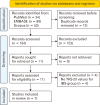Silent Struggles Within: Alexithymia Unveiled in Irritable Bowel Syndrome: A Systematic Review and Meta-analysis
- PMID: 39397617
- PMCID: PMC11474551
- DOI: 10.5056/jnm23159
Silent Struggles Within: Alexithymia Unveiled in Irritable Bowel Syndrome: A Systematic Review and Meta-analysis
Abstract
Background/aims: In recent years, the presence of alexithymia in patients with irritable bowel syndrome (IBS) has gained more attention, and several studies have evaluated this relationship. However, no clear conclusion has been reported yet. Therefore, we conducted a systematic review and meta-analysis to better understand the association between IBS and alexithymia.
Methods: We performed a systematic search on the medical databases PubMed, EMBASE, and Scopus using predefined keywords to identify observational studies assessing the association between IBS and alexithymia. The included studies diagnosed IBS using the Rome criteria, and alexithymia was evaluated using the 20-item Toronto Alexithymia Scale (TAS-20) score. We used The Newcastle-Ottawa Scale to evaluate the quality of included studies. The primary summary outcome was the mean difference in TAS-20 scores.
Results: We included 7 studies involving 1,513 individuals in our qualitative analysis, with 6 of them included in our quantitative analysis. All studies were considered to be of satisfactory quality according to the Newcastle-Ottawa Scale criteria. We found significantly higher TAS-20 scores in IBS patients compared to controls (8.063 [95% CI, 2.554-13.572]). However, no significant mean difference in TAS-20 scores was observed in IBS vs inflammatory bowel disease patients (0.884 [95% CI -2.536-4.304]).
Conclusions: We demonstrated that IBS is associated with an increased risk of developing alexithymia. However, our study did not show a significant difference in TAS-20 scores between patients with IBS compared to inflammatory bowel disease.
Keywords: Affective symptoms; Inflammatory bowel diseases; Irritable bowel syndrome; Psychological tests; Psychosomatic medicine.
Conflict of interest statement
Figures



References
-
- Dumitrascu DL, Freud T, Ismaiel A, Bangdiwala SI, Palsson OS, Sperber AD. Epidemiology and burden of disorders of gut-brain interaction in Romania: a subgroup analysis of the rome foundation global epidemiology study. J Gastrointestin Liver Dis. 2022;31:273–282. doi: 10.15403/jgld-4380. - DOI - PubMed
Publication types
LinkOut - more resources
Full Text Sources

